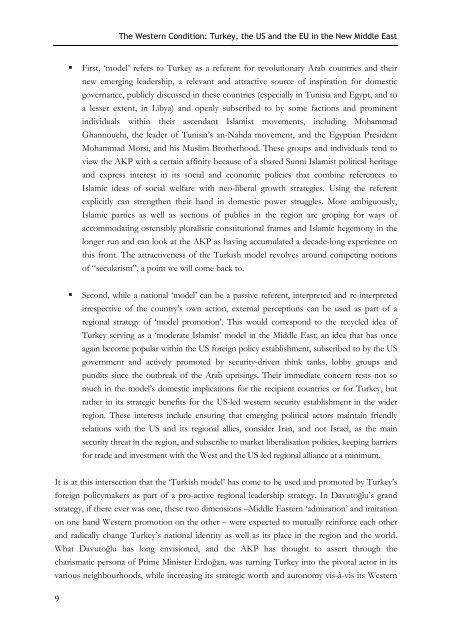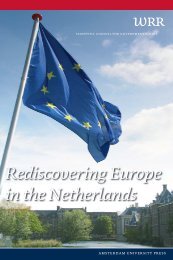The Western Condition - St Antony's College - University of Oxford
The Western Condition - St Antony's College - University of Oxford
The Western Condition - St Antony's College - University of Oxford
You also want an ePaper? Increase the reach of your titles
YUMPU automatically turns print PDFs into web optimized ePapers that Google loves.
<strong>The</strong> <strong>Western</strong> <strong>Condition</strong>: Turkey, the US and the EU in the New Middle East<br />
• First, ‘model’ refers to Turkey as a referent for revolutionary Arab countries and their<br />
new emerging leadership, a relevant and attractive source <strong>of</strong> inspiration for domestic<br />
governance, publicly discussed in these countries (especially in Tunisia and Egypt, and to<br />
a lesser extent, in Libya) and openly subscribed to by some factions and prominent<br />
individuals within their ascendant Islamist movements, including Mohammad<br />
Ghannouchi, the leader <strong>of</strong> Tunisia’s an-Nahda movement, and the Egyptian President<br />
Mohammad Morsi, and his Muslim Brotherhood. <strong>The</strong>se groups and individuals tend to<br />
view the AKP with a certain affinity because <strong>of</strong> a shared Sunni Islamist political heritage<br />
and express interest in its social and economic policies that combine references to<br />
Islamic ideas <strong>of</strong> social welfare with neo-liberal growth strategies. Using the referent<br />
explicitly can strengthen their hand in domestic power struggles. More ambiguously,<br />
Islamic parties as well as sections <strong>of</strong> publics in the region are groping for ways <strong>of</strong><br />
accommodating ostensibly pluralistic constitutional frames and Islamic hegemony in the<br />
longer run and can look at the AKP as having accumulated a decade-long experience on<br />
this front. <strong>The</strong> attractiveness <strong>of</strong> the Turkish model revolves around competing notions<br />
<strong>of</strong> “secularism”, a point we will come back to.<br />
• Second, while a national ‘model’ can be a passive referent, interpreted and re-interpreted<br />
irrespective <strong>of</strong> the country’s own action, external perceptions can be used as part <strong>of</strong> a<br />
regional strategy <strong>of</strong> ‘model promotion’. This would correspond to the recycled idea <strong>of</strong><br />
Turkey serving as a ‘moderate Islamist’ model in the Middle East; an idea that has once<br />
again become popular within the US foreign policy establishment, subscribed to by the US<br />
government and actively promoted by security-driven think tanks, lobby groups and<br />
pundits since the outbreak <strong>of</strong> the Arab uprisings. <strong>The</strong>ir immediate concern rests not so<br />
much in the model’s domestic implications for the recipient countries or for Turkey, but<br />
rather in its strategic benefits for the US-led western security establishment in the wider<br />
region. <strong>The</strong>se interests include ensuring that emerging political actors maintain friendly<br />
relations with the US and its regional allies, consider Iran, and not Israel, as the main<br />
security threat in the region, and subscribe to market liberalisation policies, keeping barriers<br />
for trade and investment with the West and the US-led regional alliance at a minimum.<br />
It is at this intersection that the ‘Turkish model’ has come to be used and promoted by Turkey’s<br />
foreign policymakers as part <strong>of</strong> a pro-active regional leadership strategy. In Davutoğlu’s grand<br />
strategy, if there ever was one, these two dimensions –Middle Eastern ‘admiration’ and imitation<br />
on one hand <strong>Western</strong> promotion on the other – were expected to mutually reinforce each other<br />
and radically change Turkey’s national identity as well as its place in the region and the world.<br />
What Davutoğlu has long envisioned, and the AKP has thought to assert through the<br />
charismatic persona <strong>of</strong> Prime Minister Erdoğan, was turning Turkey into the pivotal actor in its<br />
various neighbourhoods, while increasing its strategic worth and autonomy vis-à-vis its <strong>Western</strong><br />
9

















